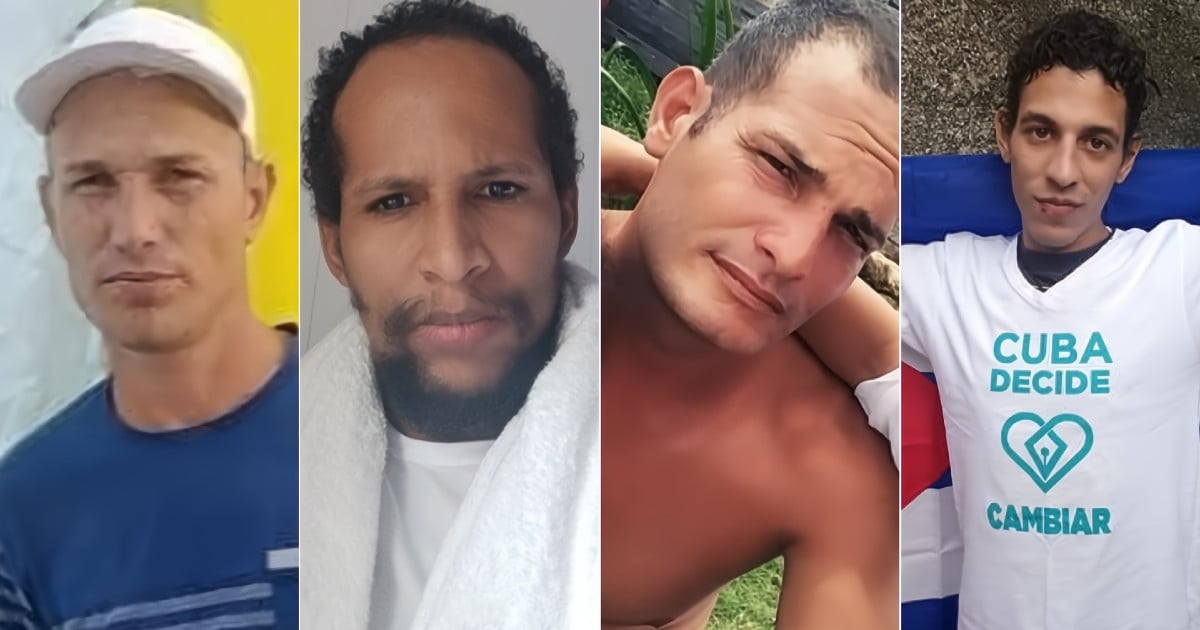The Cuban regime's crackdown on the July 11, 2021 (11J) protesters has not only led to mass incarcerations but has also resulted in a tragic toll, with at least four political prisoners having died while in custody. These deaths highlight the inhumane conditions within Cuban prisons, coupled with medical neglect and systematic abuse inflicted upon those who dared to demand freedom in a nation where dissent is brutally punished.
Lives Cut Short by Repression
Manuel de Jesús Guillén Esplugas, a 29-year-old activist, passed away on November 30, 2024, at the Combinado del Este prison in Havana. Guillén was serving a six-year sentence when, according to his family, he was brutally beaten by prison officials. His body bore clear signs of torture, although the official narrative claims it was a suicide. The absence of an independent investigation has left his family and civil society seeking justice.
Luis Barrios Díaz, sentenced to nine years in prison for participating in the 11J protests, died at La Covadonga Hospital due to respiratory complications amid medical negligence. Despite evident health deterioration, authorities failed to take timely measures to save his life, highlighting the systematic medical neglect faced by political prisoners in Cuba.
Yosandri Mulet Almarales was arrested and sentenced to five years following the 11J demonstrations. He died on August 27, 2024, in prison. Reports indicate he suffered from health issues that were inadequately addressed, leading to his fatal deterioration. Medical negligence and abandonment made him another victim of the Cuban prison system.
Gerardo Díaz Alonso, a political prisoner sentenced to eight years, died on October 18, 2024. His death, linked to untreated health complications in prison, underscores the pattern of neglect and abuse toward detainees. According to human rights organizations, the lack of adequate medical care was a decisive factor in his demise.
These accounts, verified by human rights organizations, illustrate how the regime leverages the prison system to punish and silence those who challenge its authority. These losses are part of a broader context of widespread abuse, with over 650 political prisoners reportedly suffering from severe health conditions, and another 70 experiencing serious mental disorders, according to recent reports from Prisoners Defenders. These figures reflect a penitentiary system used as a tool of repression, where the health and dignity of inmates are continuously violated.
Widespread Repression and Neglect
Since July 2021, the regime has imprisoned more than 1,500 individuals for participating in the protests, of whom 554 remain incarcerated, facing sentences of up to 20 years. These numbers not only reveal the scale of the repression but also its indiscriminate nature: many of those jailed had no prior history of opposition or activism.
In addition to these sentences, psychological and physical torture, prolonged isolation, and denial of medical care are rampant. Moreover, repression extends beyond prison walls, manifesting in arbitrary internet shutdowns, beatings of protesters, and a public discourse that seeks to dehumanize opponents.
International Silence and the Call for Justice
The international community's complicit silence regarding these deaths is alarming. Cuba has been a recurring topic in international forums, yet concrete actions to pressure the regime remain insufficient. Civil society, both within and outside the island, demands justice and the immediate release of all political prisoners.
As Prisoners Defenders aptly states, the situation is "critical and heartbreaking." The Cuban dictatorship, once touted as a model of social justice, is now a repressive machine that stifles any semblance of freedom. The deaths of Guillén, Barrios, Mulet, Díaz, and other prisoners serve as the harshest reminder of this reality.
The cry for freedom that echoed through the streets of Cuba on 11J has not been silenced, despite the regime's attempts to quash it. The deaths of these political prisoners, rather than silencing the opposition, underscore the urgent need for profound change in the country. The international community and civil society must intensify efforts to bring these crimes to light and demand justice for those who sacrificed their lives in the struggle for freedom.
Understanding the Human Rights Crisis in Cuba
What led to the 11J protests in Cuba?
The 11J protests in Cuba were fueled by widespread dissatisfaction with the government's handling of economic hardships, restrictions on freedoms, and the worsening humanitarian situation. Citizens took to the streets demanding change and greater freedoms.
How has the international community responded to the situation in Cuba?
While Cuba has been a topic of discussion in international forums, the response has been largely insufficient. Many activists and organizations call for more decisive actions to pressure the Cuban government to halt its repressive practices and release political prisoners.
What are the conditions like for political prisoners in Cuba?
Political prisoners in Cuba often face inhumane conditions, including medical neglect, physical and psychological torture, and prolonged isolation. These conditions are part of a broader strategy to punish and silence dissenters.
